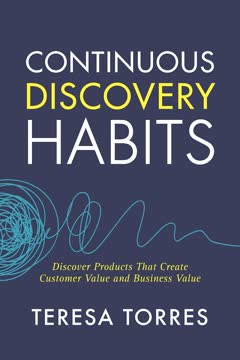Key Takeaways
1. Build a Job Search Council for emotional support and networking
Your JSC will help you convert those insecurities and fears into hope, confidence, accountability, and motivation to find a good job.
Emotional support is crucial. The job search process can be emotionally taxing, filled with insecurities and anxieties. A Job Search Council (JSC) provides a support system to manage these emotional challenges and maintain motivation throughout the search.
Leverage collective intelligence. A JSC typically consists of 4-6 peer job seekers who meet regularly to share insights, provide feedback, and hold each other accountable. This group can offer diverse perspectives, expand your network, and help you see through blind spots in your search strategy.
Mutual reinforcement. The act of helping others in your JSC can boost your own confidence and motivation. This "job seeker see, job seeker do" dynamic creates a positive feedback loop that benefits all members of the group.
2. Conduct a Listening Tour to understand your market value
Listening to the market does not mean that you will necessarily get the answer you want. Quite often, it's the opposite. You may find out that your goal is beyond your current market fit.
Market research on yourself. The Listening Tour involves conducting informational interviews with former colleagues, industry professionals, and recruiters to gain insights into how the market perceives your skills and experience.
Key components of the Listening Tour:
- Reverse Exit Interviews: Ask former colleagues about your strengths and areas for improvement
- The Golden Question: Ask contacts "If you were in my shoes, how would you approach this job search?"
- Recruiter Interviews: Gain insights into what jobs you could get easily, which would be a stretch, and which are out of reach
Stay open-minded. The feedback you receive may not always align with your self-perception or career goals. Use this information to refine your understanding of your market value and adjust your job search strategy accordingly.
3. Craft your Candidate-Market Fit statement to focus your search
Strategy is how you achieve that goal, hope, or aspiration.
Align goals with market reality. Your Candidate-Market Fit statement should reflect the intersection of what you want and what the market wants. This focused approach helps guide your job search and makes it easier for your network to help you.
Components of a strong Candidate-Market Fit statement:
- Clear and concise (often one sentence)
- Reflects your skills, experience, and career goals
- Aligns with market demand and opportunities
Iterative process. Your Candidate-Market Fit may evolve as you gain more insights from your Listening Tour and networking efforts. Be prepared to refine your statement as needed throughout your job search.
4. Master the art of asking for help throughout your career
I find that many people are inconsistent in their thank-you notes and often negligent in providing ongoing monthly or quarterly updates to those they've spoken to during their Listening Tour.
Overcome the stigma. Many people hesitate to ask for help due to fear of appearing weak or incompetent. Recognize that asking for help is a sign of strength and self-awareness, not weakness.
Build relationships through gratitude. Always send thank-you notes after receiving help and provide regular updates to your network. This practice strengthens relationships and keeps your contacts engaged in your job search.
Reciprocate. Be willing to help others in your network when they need assistance. This creates a culture of mutual support that can benefit you throughout your career.
5. Prepare thoroughly for interviews and create a Job Mission
Interviewing isn't a competition where success means landing any job you interview for. You want to land a job that is just as right for you as you are right for the company.
Research extensively. Before interviews, thoroughly research the company's strategy, products, culture, and financial performance. Use this information to prepare thoughtful questions and demonstrate your genuine interest in the role.
Create a Job Mission with OKRs. Develop a clear statement of the objectives and key results (OKRs) you plan to achieve in the role. This demonstrates your understanding of the job and your commitment to delivering results.
Conduct backchannel research. Leverage your network to gain insights into your potential boss, company culture, and any potential challenges you might face in the role.
6. Negotiate salary, resources, and support to set yourself up for success
Negotiate how the company is going to invest in your success, including everything and anything: funding for a team or project, investing in your own professional learning and development, or making a commitment to helping you get on boards of directors.
Negotiate beyond salary. While salary is important, also focus on negotiating the budget, resources, and support you'll need to succeed in your new role. This can include team members, technology investments, mentoring, and professional development opportunities.
Use your Job Mission as leverage. Your well-crafted Job Mission with OKRs can serve as a powerful tool in negotiations, demonstrating your commitment to success and justifying your requests for resources and support.
Overcome fear of asking. Remember that research shows 83% of people who ask for more in negotiations receive it. Your JSC can provide emotional support and practice to help you overcome any hesitation in asking for what you need.
7. Prepare strategically for your new role to ensure a strong start
Before you start your new job, ask yourself again: How can I fail at this new job?
Continue backchannel research. Before starting your new role, gather more insights about your new boss, company culture, and potential challenges you might face.
Conduct a failure analysis. Ask yourself and your JSC how you might fail in this new role. This exercise can help you identify potential pitfalls and develop strategies to avoid them.
Organize a Peer Coaching Call. Arrange a call with 3-4 professionals already doing the job you're about to start. Use this opportunity to gain insights on how to approach your first 90 days and avoid common mistakes.
Stay connected with your support network. Continue to leverage your JSC and broader network as you transition into your new role. Their ongoing support and advice can be invaluable as you navigate the challenges of a new position.
Last updated:
FAQ
What's "Never Search Alone: The Job Seeker's Playbook" about?
- Comprehensive job search guide: "Never Search Alone" by Phyl Terry is a detailed guide for job seekers, offering a structured approach to finding a job that fits both personal and market needs.
- Social Search methodology: The book introduces a five-step process called Social Search, emphasizing the importance of community and support in the job search.
- Focus on self-discovery: It encourages job seekers to understand their own strengths and market fit before diving into networking and interviews.
- Practical tools and exercises: The book provides actionable exercises and tools, such as the Job Search Council and Candidate-Market Fit, to aid in the job search process.
Why should I read "Never Search Alone: The Job Seeker's Playbook"?
- Unique approach: The book offers a unique approach to job searching that focuses on community support and self-discovery, which can lead to more fulfilling career choices.
- Actionable advice: It provides practical, step-by-step guidance and tools that can be immediately applied to improve your job search strategy.
- Emotional support: The emphasis on building a Job Search Council helps manage the emotional roller coaster of job searching, providing hope and motivation.
- Long-term career benefits: By following the book's methodology, readers can not only find a job but also set themselves up for long-term career success and satisfaction.
What are the key takeaways of "Never Search Alone: The Job Seeker's Playbook"?
- Never search alone: Form a Job Search Council to provide emotional support and accountability throughout the job search process.
- Conduct a Listening Tour: Before networking, understand how the market perceives you and what opportunities exist.
- Define Candidate-Market Fit: Clearly articulate the intersection of your skills, desires, and market needs to focus your job search.
- Negotiate comprehensively: Beyond salary, negotiate for the budget, resources, and support needed to succeed in your new role.
How does the Social Search methodology work in "Never Search Alone"?
- Five-step process: The methodology includes forming a Job Search Council, conducting a Listening Tour, defining Candidate-Market Fit, networking and interviewing, and negotiating.
- Community support: Emphasizes the importance of mutual support and accountability through a Job Search Council.
- Market research: Encourages understanding market needs and personal strengths before engaging in job applications.
- Iterative learning: Promotes continuous learning and adaptation throughout the job search process.
What is a Job Search Council according to "Never Search Alone"?
- Mutual support group: A Job Search Council (JSC) is a group of peer job seekers who support each other throughout the job search.
- Emotional balance: Provides emotional support, helping members convert fear and insecurity into hope and confidence.
- Practical advice: Members offer practical advice and feedback on resumes, interviews, and job offers.
- Accountability: Helps keep members accountable and motivated during the job search process.
What is the Candidate-Market Fit in "Never Search Alone"?
- Intersection of skills and market: Candidate-Market Fit is the alignment between a job seeker's skills, desires, and what the market needs.
- Focus and clarity: It requires job seekers to clearly define what roles they are best suited for and focus their search accordingly.
- Guides job search strategy: Acts as a guiding principle for networking, interviewing, and negotiating.
- Avoids wasted effort: Helps prevent job seekers from pursuing roles that are not a good fit, saving time and energy.
How does "Never Search Alone" suggest handling job interviews?
- Research thoroughly: Conduct in-depth research on the company, its culture, and its products before the interview.
- Prepare questions: Develop questions to ask the employer, focusing on role expectations, company culture, and strategic goals.
- Create a Job Mission: Draft a Job Mission with OKRs to align expectations and impress potential employers.
- Post-interview debrief: Conduct a debrief with a JSC member to reflect on the interview and identify any red flags.
What negotiation strategies are recommended in "Never Search Alone"?
- Negotiate beyond salary: Focus on negotiating for the budget, resources, and support needed to succeed in the role.
- Use Job Mission: Leverage the Job Mission with OKRs to justify requests for additional support and resources.
- Ask for help: Utilize the JSC to gain confidence and advice on negotiation tactics.
- Comprehensive preparation: Prepare thoroughly by understanding industry standards and personal needs before entering negotiations.
What are some of the best quotes from "Never Search Alone" and what do they mean?
- "Never search alone": Emphasizes the importance of community and support in the job search process, highlighting that collaboration leads to better outcomes.
- "Convert fear into hope": Suggests that emotional support from a JSC can transform negative emotions into positive motivation.
- "Candidate-Market Fit": Encourages job seekers to find the sweet spot between their skills and market needs, ensuring a focused and effective job search.
- "Negotiate for success": Advises job seekers to negotiate not just for salary but for the resources and support needed to thrive in a new role.
How does "Never Search Alone" address emotional challenges in job searching?
- Emotional roller coaster: Acknowledges the emotional ups and downs of job searching and provides strategies to manage them.
- Support system: Recommends forming a JSC to provide emotional support and accountability.
- Gratitude exercises: Encourages exercises like Gratitude House to boost confidence and maintain a positive outlook.
- Focus on hope: Emphasizes converting fear and insecurity into hope and motivation through community support.
What role does self-discovery play in "Never Search Alone"?
- Listening Tour: Encourages job seekers to conduct a Listening Tour to understand their strengths and market fit.
- Mnookin Two-Pager: Suggests creating a document outlining what you love, hate, and your career goals to guide the job search.
- Continuous learning: Promotes ongoing self-discovery and adaptation throughout the job search process.
- Aligning goals: Helps job seekers align their personal goals with market opportunities for a more fulfilling career.
How can "Never Search Alone" help with long-term career success?
- Building a network: Encourages forming lasting relationships through a JSC and broader network, which can support future career moves.
- Negotiating for growth: Advises negotiating for resources and support that can lead to promotions and career advancement.
- Learning to ask for help: Teaches the importance of asking for help, a skill that can benefit career growth and development.
- Career councils: Suggests converting a JSC into a Career Council for ongoing support and guidance in career progression.
Review Summary
Never Search Alone emphasizes a collaborative approach to job searching, advocating for peer support networks and strategic self-analysis. Readers appreciate its fresh perspective on career transitions, praising the focus on understanding one's market fit and the value of support groups. Many found the book's advice practical and transformative, especially for mid-career professionals. While some critics noted repetitive content and a heavy focus on Silicon Valley, most reviewers found the book's central concepts valuable. The accompanying online resources and community were highly regarded by many readers.
Similar Books









Download PDF
Download EPUB
.epub digital book format is ideal for reading ebooks on phones, tablets, and e-readers.




